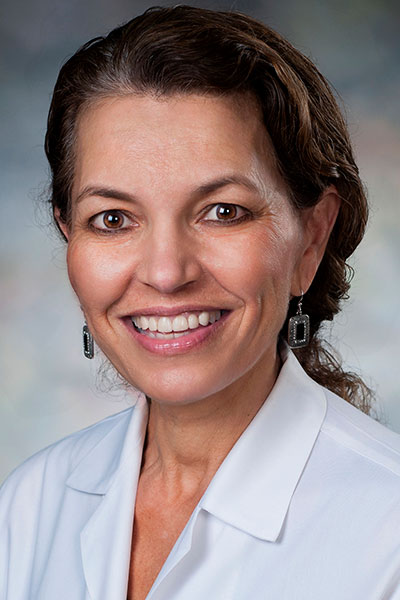
Through more than four decades in pulmonary and critical care medicine, Mark J. Rosen, MD, Master FCCP, provided a lifetime’s worth of education and mentorship around the world. At CHEST 2022, a new endowed lecture in his memory honored a fellow CHEST leader who shares that passion and is helping to carry Dr. Rosen’s spirit forward.
Stephanie M. Levine, MD, FCCP, professor of pulmonary diseases and critical care medicine at UT Health San Antonio and CHEST President from 2019 to 2020, delivered the inaugural Mark J. Rosen, MD, Master FCCP, Endowed Memorial Lecture on Wednesday, October 19.
Dr. Levine explored the topic of Pulmonary and Critical Care Disorders in Pregnancy: What You Learned in Fellowship and Beyond using a case-based approach that incorporated audience responses—one of Dr. Rosen’s favored teaching styles. Between each case, she interspersed photos and memories of her close friend and mentor, highlighting his term as CHEST President from 2006 to 2007, his role as Emcee of CHEST Challenge, and his international impact through educational outreach and training programs.
The first case presented by Dr. Levine focused on pregnancy and VTE. The case involves a 32-year-old G1P0 woman in her 30th week of pregnancy who presents with acute onset shortness of breath, pleuritic chest pain, and hypoxemia.
Dr. Levine walked the audience through the guidelines recommended as the most cost-effective treatment course and presented context for the topic, noting that VTE is the leading cause of mortality in pregnancy, affecting up to about 0.1% of pregnancies. The risk for VTE increases over trimesters and continues into the postpartum period. She also reviewed relevant and appropriate treatment options for VTE in pregnancy.
The second case discussion related to the treatment of asthma during pregnancy, which Dr. Levine said is generally treated similarly in the pregnant state as the nonpregnant state, with some exceptions.
The current consensus recommendation is that inhaled corticosteroid (ICS) dose should not be stepped down in pregnancy. Actively treating asthma in pregnancy outweighs the potential risks of usual controller and reliever medications, Dr. Levine said.

“Stopping ICS during pregnancy is a significant risk factor for exacerbations. We know that exacerbations are associated with adverse maternal and infant outcomes,” Dr. Levine said.
Dr. Levine also walked attendees through a case related to HELLP (hemolysis, elevated liver enzymes, low platelets) Syndrome, which is diagnosed in about one to two pregnancies per 1,000 and usually occurs in the third trimester.
Finally, the last case presentation related to COVID-19. Dr. Levine noted that she often wonders what Dr. Rosen, who died in the summer of 2019, would have thought of the recent pandemic, since he launched his research career during the HIV/AIDS epidemic and became an expert on pulmonary infection in the immunocompromised host.
COVID-19 during pregnancy has been linked with worse maternal morbidity and mortality. When dealing with COVID-19 in pregnancy there are higher rates of ICU admission, use of mechanical ventilation or ECMO, and death. Additionally, there is a higher risk of preterm birth and stillbirth.
Dr. Levine discussed the currently established practical approach algorithm for critically ill pregnant patients with COVID-19, how to handle mechanical ventilation in ARDS, use of prone positioning, and the most appropriate pharmacological treatments.
When closing the case study portion of her presentation, Dr. Levine encouraged attendees who treat pulmonary and critical care disorders to be familiar with the normal physiology of pregnancy and to collaborate with other clinicians.
“In general, most pulmonary and critical care issues are managed similarly to those in the nonpregnant patient, but there are a few unique diagnoses and very important caveats,” Dr. Levine said. “And remember that decisions should always be collaborative with pulmonologists, intensivists, obstetricians, our high-risk group neonatologists, our obstetrical anesthesiologists, and, of course, our specialty nursing.”
Dr. Levine concluded the lecture with photos of Dr. Rosen’s friends and family and a tribute to his lasting legacy.
“A toast to him on behalf of the thousands of clinicians Mark educated and mentored and made laugh over his career. We all thank you.”



